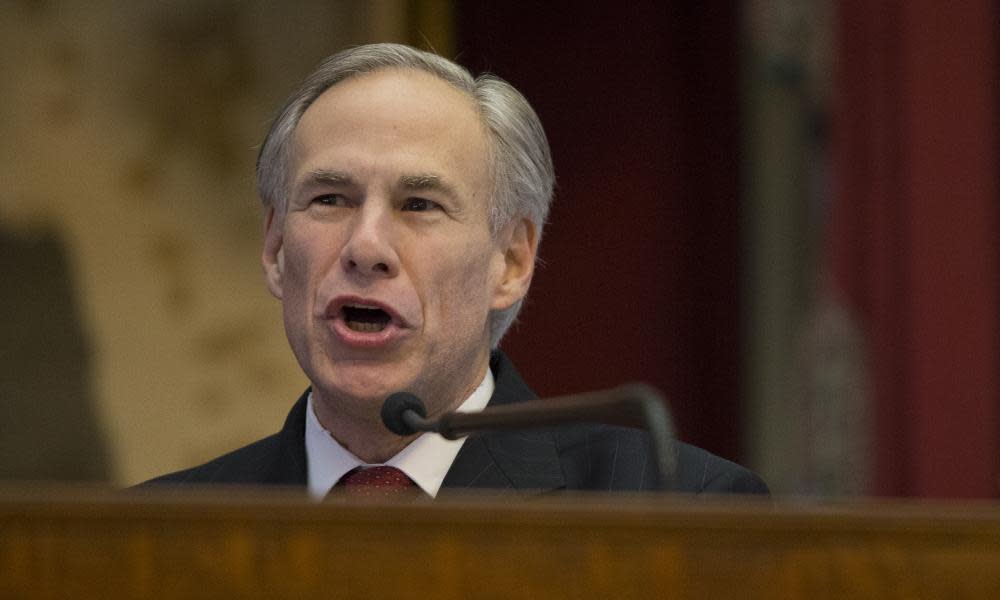Why Texas' governor is pitching a losing battle with NFL over 'bathroom bill'

By taking on the NFL, Texas governor Greg Abbott is entering into a battle he cannot win. The world’s biggest sports league has threatened to withhold signature events if Abbott and the state’s Republicans push forward with a bathroom bill targeted at transgender people. Foolishly he has chosen to challenge them.
“The NFL needs to concentrate on football and get the heck out of politics,” he told conservative radio host Glenn Beck this week.
“They need to learn their place in the United States,” he added.
“(The league) is walking on thin ice,” he also said.
What Abbott and lieutenant governor Dan Patrick (who also supports the bill) need to understand is that the NFL has no choice in taking their stand. The league already has set a precedent for punishing intolerance. Back in 1990 the NFL awarded the 1993 Super Bowl to Tempe, Arizona, before moving the game several months later to Pasadena, California, after Arizona voters refused to recognize Martin Luther King’s birthday as a state holiday.
The league’s commissioner then was blunt in his dismissal of Arizona.
“I do not believe playing Super Bowl XXVII in Arizona is in the best interest of the National Football League,” Paul Tagliabue said. “Arizona can continue its political debate with out the Super Bowl as a factor.”
Two years later, Arizona finally adopted Martin Luther King Day as a holiday. The league rewarded the move by giving Tempe the 1996 Super Bowl, won, ironically, by the Dallas Cowboys.
This isn’t a game of chicken the NFL is playing with Texas. If the state passes a law that targets transgender people, the league will look elsewhere when awarding Super Bowls no matter how much Cowboys owner Jerry Jones longs to host another game in his Arlington stadium. It’s a good thing Houston had their Super Bowl earlier this month; the state might not see another for a long, long time.
There is a legitimate debate to be had about whether hosting a Super Bowl is worth the cost and hassle. The NFL demands a tax-free, rent-free ransom from their Super Bowl cities. Dallas and Houston could be lucky to find themselves out of consideration for the next batch of games that start with 2022. Still, all fiscal sanity aside, no elected official wants to lose a big game and the prestige that comes with it because they sit alone on a Do-Not-Apply list.
Abbott must think he can win a public-relations war with the NFL. Lord knows the NFL has done enough wrong the last few years and the league’s declining ratings last season make it seem like less of the giant than in the past. But the NFL remains powerful and the Super Bowl continues to be one of the largest cultural events of the year – a kind of big that Texas likes. If the league can take away a Super Bowl that had actually been awarded, it certainly can refuse to consider one in a place that promotes hate.
Still Abbott persists in his NFL attacks. The other day he dared the league with a tweet that said: “NFL decision makers also benched Tom Brady last season. It ended with the NFL handing the Super Bowl trophy to Brady.”
His parallel makes no sense. Sure Brady won the Super Bowl but only after fighting the league for nearly two seasons, exhausting court challenges before finally accepting a four-game suspension he probably could have negotiated to one or two games. Brady might not have lost much in salary thanks to his heavily backloaded contract yet he was hardly a Deflategate winner. Does Texas want years of costly, drawn-out court battles over a chance to host a football game?
The NFL is a far more socially conscious league than in 1990. Players today have a freedom to express opinions and beliefs they never enjoyed before. The NFL of the early 90s would not have tolerated overt displays of protest like 49ers quarterback Colin Kaepernick’s refusal to stand for the national anthem. Neither would NFL players have felt comfortable pulling out of a public-relations trip to Israel funded by the Israeli government over fears they were being used as political tools. Being political was something few players dared to be in those days.
To get an idea of what the NFL is today, watch the public-service announcement they helped to make with the Ad Council, showing gay, lesbian and interracial couples kissing in the stands at last month’s Pro Bowl. Look closely at the smiling faces in the stands and the applauding fans. America’s top sports league isn’t glancing away from intolerance.
“The NFL is strongly committed to diversity and inclusion,” Anna Isaacson, the league’s vice president of social responsibility recently told Ad Week.
The battle over bathroom bills is a silly one. Why are willing to fight so much to keep transgender people from urinating in rooms that correspond to their proper gender? Of all the stands to take, the wars to choose, why this one? Does Texas really want to sacrifice Super Bowls simply to make someone who identifies as gender different from that on birth certificate uncomfortable in the rest room? What’s the point anyway?
But if Abbott and Patrick must wade into this duel with the NFL, they have to know they will lose, just as Arizona lost and North Carolina lost when the NCAA pulled their championship events and the NBA moved this weekend’s All-Star Game from Charlotte to New Orleans over a similar law last year. Maybe Abbott doesn’t care about Super Bowls, though given the way he has challenged the NFL it seems like he does. He appears to want a war with the league over a bathroom bill.
It’s a war he will not win.

 Yahoo News
Yahoo News 
